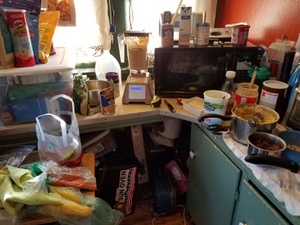
I recently shared here the story of his recent eye exam. To briefly recap, this office (which has in his files a fairly extensive list of his diagnoses) has a nurse-type person come in to do the initial exam, then the doctor comes in after. The not-doctor person asked T to identify the letters, and he could not. It became unclear whether he couldn’t see them or whether he couldn’t name them – so I asked her if we could switch to shapes. She refused because “he did letters last year.”
And yes, he did do letters last year. But he’s been struggling with it this fall. Can he not remember? Can he not get his brain to make his mouth say the thing? Is he just worried that he’ll say the wrong thing and that makes it impossible to say anything? I don’t know. His brain is a total mystery some days. But, regardless, the provider digging in her heels and insisting that he could do it when he obviously wasn’t going to be able to wasn’t helping at all.
She huffed off with “I’ll let the doctor deal with it.” The doctor came in, tried twice, then I asked him if he could see the letter but couldn’t tell us its name and he nodded, and she said “oh! ok. Here!” and handed him a sheet of paper with the letters on it so he could point to the letter instead of saying it.
Perfect.
So easy.
What was the difference? The eye doctor was focused on her goal – determining T’s ability to see. The nurse person was focused on following her routine (and possibly NOT “giving in” to “stubborn kids”).
Things go better when you stay focused on your goal.
The goal of this appointment was to figure out what he can and cannot see, not to test his knowledge of the alphabet. What’s the best and easiest way to achieve that goal? Is it to insist he identify letters? Or is it to use any of the easy workarounds you have?
Even if you believe with all your heart that he CAN identify letters, does making letter identification into the central issue of the appointment actually achieve your goal of determining his visual acuity?
I’m going to tell you another story now. This one’s about speech therapy. T worked with a handful of speech therapists over the years and we weren’t ever really happy with any of them, but I couldn’t put my finger on exactly why. Then we met his current speech therapist and I understood. This speech therapist knows what her goal is and works to achieve that goal, without ALSO making him work on other hard things.
His previous speech therapist was trying to have him do things like touch a dot for each syllable – except 1:1 correspondence is ALSO hard for him, so this was like “work on this hard thing while also doing another hard thing” and we never got any results from it. (Imagine trying to learn to play the flute while ALSO having to stand on one foot on a balance beam.) Another one had him pairing gross motor with some of his exercises – and T’s a kid who has motor planning issues, so PLANNED gross motor movement requires his entire brain. That doesn’t leave much room for the speech therapy goal to be achieved.
The current speech therapist just moves on right away when something she wanted to try is just too hard – not because she doesn’t believe he can do the thing, but because she recognizes that spending her time working on motor skills (or whatever) does NOT achieve her goals of working on the speech skills. He made so much more progress with her in 12 sessions than he did in several years with other therapists.
Stay focused on your goal and minimize unnecessary obstacles.



















